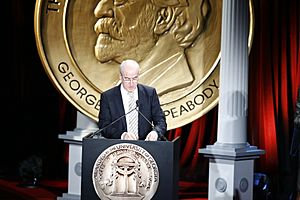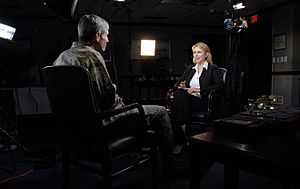60 Minutes facts for kids
Quick facts for kids 60 Minutes |
|
|---|---|

Title card used since October 2006
|
|
| Genre | News magazine |
| Created by | Don Hewitt |
| Presented by |
See Correspondents section |
| Country of origin | United States |
| Original language(s) | English |
| No. of seasons | 58 |
| No. of episodes | 2500+ |
| Production | |
| Executive producer(s) |
|
| Camera setup | Multi-camera |
| Running time | 60 minutes, including commercials |
| Production company(s) | CBS News Productions |
| Distributor |
|
| Release | |
| Original network | CBS |
| Picture format | NTSC (1968–2008) HDTV 1080i (starting 2008) |
| Original release | September 24, 1968 – present |
| Chronology | |
| Related shows | 60 Minutes (Australia) 48 Hours Face the Nation CBS Overnight News |
60 Minutes is a popular American news magazine television show. It airs on the CBS network. The show first started in 1968. It was created by Don Hewitt and Bill Leonard. They wanted to make a news show that was different. They focused on reporters doing deep investigations.
60 Minutes has been highly praised. In 2002, TV Guide magazine called it one of the "50 Greatest TV Shows of All Time". In 2013, it was ranked among the "60 Best Series of All Time". The New York Times has also called it "one of the most esteemed news magazines on American television".
The show first aired in 1968. It was a bi-weekly show hosted by Mike Wallace and Harry Reasoner. They sat on opposite sides of a cream-colored set. Later, the set changed to black, which is still used today. The show uses a large stopwatch during transitions. It also highlights topics using a special screen effect called chroma key. Both of these features are still used today.
In 1972, 60 Minutes started airing on Sundays. It was usually from 6:00 p.m. to 7:00 p.m. Eastern time. Sometimes, NFL games would change its start time. The show generally keeps its Sunday evening spot. It usually starts at 7:00 p.m. Eastern. If there are sports games on, it might start at 7:30 p.m. Eastern or after the game ends.
Several reporters host the show. They do not share screen time with each other. The main hosts include Lesley Stahl, Scott Pelley, Bill Whitaker, and Cecilia Vega. There have also been many other versions of the show. These include international versions in other countries.
Contents
How 60 Minutes Started and Grew
Early Days of the Show
60 Minutes used a style similar to a magazine. It was like the Canadian show W5, which started two years earlier. The show helped create many important ways of doing investigative journalism. This included editing interviews carefully. It also used hidden cameras and surprised people with questions.
The show first aired every other week. It started on September 24, 1968. It was on Tuesday evenings at 10:00 p.m. Eastern Time. The first episode was like a "magazine for television." It had different parts:
- A look at the offices of presidential candidates Richard Nixon and Hubert Humphrey.
- Thoughts from European writers about the American election system.
- A funny commentary by writer Art Buchwald.
- An interview with Attorney General Ramsey Clark about police actions.
- A short, scripted piece where two men talked about the election.
- A shorter version of an Academy Award-winning film called Why Man Creates.
- A discussion by Mike Wallace and Harry Reasoner about what is real.
The show used a special screen effect for its topics. The first one showed two policemen. Mike Wallace and Harry Reasoner sat in chairs on a cream-colored set. The famous black set appeared later. The show's well-known stopwatch did not appear in the very first episode. It was added a few episodes later.
Don Hewitt, who produced the CBS Evening News, wanted Mike Wallace to work with Harry Reasoner. The idea was for the hosts to be the reporters. They would tell stories that were important to the country. These stories would focus on people involved in big issues. Each report was planned to be about 13 minutes long.
At first, the show struggled to get high ratings. News shows during prime time usually did not make money. Networks showed them to make their news departments look good. This would help their regular evening news shows get more viewers. 60 Minutes faced this challenge for its first three years.
Changes came early to 60 Minutes. When Harry Reasoner left, Morley Safer joined in 1970. He took over reporting less aggressive stories. But soon, Safer also started doing "hard" investigative reports. In one season, 60 Minutes reported on cluster bombs, the South Vietnamese Army, and the Middle East.
Moving to Sundays and Gaining Popularity
In 1971, a new rule called the Prime Time Access Rule was made. This rule meant local TV stations had to give up some prime time hours. They could use this time for their own local news or public affairs shows. Most stations found this too expensive. So, an exception was made for network news shows.
After a break, CBS found a new spot for 60 Minutes. It moved to Sundays from 6:00 p.m. to 7:00 p.m. Eastern in January 1972. This time slot was sometimes difficult. This was because CBS often showed late afternoon National Football League (NFL) football games. These games were protected by contracts. So, 60 Minutes would sometimes be off the air during the fall from 1972 to 1975.
Despite the changing schedule, the show's strong reports attracted more and more viewers. This was especially true during the end of the Vietnam War and the Watergate scandal. At that time, few other major news shows did such deep investigative reporting.
In 1975, the rule changed again. CBS was able to get an hour back on Sundays for news or family shows. This is when 60 Minutes found its permanent home. It moved to 7:00 p.m. Eastern Time (6:00 p.m. Central) on December 7, 1975. It has been in that spot ever since. This makes it one of the longest-running prime time shows. It is also the longest-running show to air at the same time each week in U.S. television history.
This move, and the addition of White House reporter Dan Rather, made the show a huge success. It became a cultural phenomenon. This was amazing because news shows usually did not get high ratings in prime time. By 1976, 60 Minutes was the top-rated show on Sunday nights. By 1979, it was the number one show overall in the Nielsen ratings. This was unheard of for a news show. This success brought a lot of money to CBS.
Sometimes, 60 Minutes starts later than 7:00 p.m. Eastern. This is usually because of CBS Sports live sporting events. When an NFL game ends, 60 Minutes will air fully. All other shows after it will be delayed. However, in the Pacific time zone, 60 Minutes always starts on time. This is because live sports end earlier there.
Since 2012, CBS changed the scheduled start time of 60 Minutes to 7:30 p.m. Eastern. This happens if a late NFL game is airing in the Eastern and Central Time Zones. The start time remains 7:00 p.m. Eastern/Pacific if there is no late game.
Radio and Online Access
60 Minutes is also broadcast on several radio stations. These include KYW in Philadelphia and WBBM in Chicago. These stations are owned by Audacy. The show airs on the radio at the top of the hour. This means radio listeners often hear the show before it airs on TV.
You can also listen to an audio version of each broadcast without commercials. This started in 2007 through podcasts and the iTunes Store. Full episodes and clips are also available online. You can stream them on CBSNews.com and Paramount+ after the show airs.
How the Show Works
60 Minutes usually has three long news stories. There are no graphics on the screen during the stories. There is a commercial break between two of the stories. Each story is introduced from a set that looks like a magazine page.
The show does its own investigations. It also follows up on stories from newspapers and other sources. Unlike other news shows, the 60 Minutes reporters never appear on screen with each other. They also do not talk to each other on camera. This makes viewers feel a stronger connection to the reporter.
Online Content
Videos and written versions of 60 Minutes episodes are available on the show's website. You can also find clips that were not shown on TV. In 2010, the show launched "60 Minutes Overtime." This website discusses stories in more detail.
Who Works on 60 Minutes
Current Reporters and Hosts
- Current hosts
- Lesley Stahl (host, 1991–present)
- Scott Pelley (host, 2003–present)
- Bill Whitaker (host, 2014–present)
- Cecilia Vega (host, 2023-present)
- Current part-time reporters
- Anderson Cooper (2006–present) (also at CNN)
- Norah O'Donnell (2015–present)
- Sharyn Alfonsi (2015–present)
- Jon Wertheim (2017–present)
Past Reporters and Hosts
- Former hosts
- Mike Wallace ꝋ (host, 1968–2006)
- Harry Reasoner ꝋ (host, 1968–1970, 1978–1991)
- Morley Safer ꝋ (host, 1970–2016)
- Dan Rather (host, 1975–1981 and 2005–2006)
- Ed Bradley ꝋ (host, 1981–2006)
- Diane Sawyer (host, 1984–1989)
- Meredith Vieira (host, 1990–1991)
- Bob Simon ꝋ (1996–2015)
- Christiane Amanpour (host, 2000–2005)
- Lara Logan (host, 2012–2018)
- Steve Kroft (host, 1989–2019)
- John Dickerson (2019–2021)
- Former part-time reporters
- Walter Cronkite ꝋ (1968–1981)
- Charles Kuralt ꝋ (1968–1979)
- Roger Mudd ꝋ (1968–1980)
- Bill Plante ꝋ (1968–1995)
- Eric Sevareid ꝋ (1968–1969)
- John Hart (1969–1975)
- Bob Schieffer (1973–1996)
- Morton Dean (1975–1979)
- Marlene Sanders ꝋ (1978–1987)
- Charles Osgood (1981–1994)
- Forrest Sawyer (1985–1987)
- Connie Chung (1990–1993)
- Paula Zahn (1990–1999)
- John Roberts (1992–2005)
- Russ Mitchell (1995–1998)
- Carol Marin (1997–2002)
- Bryant Gumbel (1998–2002)
- Vicki Mabrey (1999-2005)
- Katie Couric (2006–2011)
- Charlie Rose (2008–2017)
- Byron Pitts (2009–2013)
- Sanjay Gupta (2011–2014)
- Alison Stewart (2012)
- Clarissa Ward (2012–2015)
- Oprah Winfrey (2017–2018)
Commentators
Commentators for 60 Minutes have included:
- James J. Kilpatrick ꝋ (conservative debater, 1971–1979)
- Nicholas von Hoffman ꝋ (liberal debater, 1971–1974)
- Shana Alexander ꝋ (liberal debater, 1975–1979)
- Andy Rooney ꝋ (commentator, 1978–2011)
- Stanley Crouch ꝋ (commentator, 1996)
- Molly Ivins ꝋ (liberal commentator, 1996)
- P. J. O'Rourke ꝋ (conservative commentator, 1996)
- Bill Clinton (liberal debater, 2003)
- Bob Dole ꝋ (conservative debater, 2003)
ꝋ = Deceased
Awards and Viewership Success
Nielsen Ratings and Viewers
Ratings show that 60 Minutes is one of the most successful shows in U.S. television history. This is true since it moved to its current time slot in 1975. It was the top show of the year for five seasons. Only American Idol has been number one for more seasons.
60 Minutes was in the Top 10 shows for 23 seasons in a row (1977–2000). This is a record that no other show has beaten. It has been in the Top 20 for almost every season since 1976–1977. It is still the highest-rated news magazine show.
On November 16, 2008, an episode with an interview with President-elect Barack Obama had 25.1 million viewers. This was a very high number.
On October 6, 2013, the show was delayed by an NFL game. It still had 17.94 million viewers. This made it the most watched 60 Minutes broadcast since December 16, 2012.
On December 1, 2013, another episode delayed by an NFL game had 18.09 million viewers.
On March 25, 2018, an episode with Stormy Daniels had 22.1 million viewers. This was the most since the 2008 Obama interview. This broadcast was also delayed by a basketball game.
Awards and Recognition

As of June 2017, 60 Minutes had won 138 Emmy Awards. This is a record for U.S. prime time shows.
The program has also won 20 Peabody Awards. These awards recognize excellence in television.
The show received an Investigative Reporter and Editor medal for its story "The Osprey." This story showed problems with the V-22 Osprey aircraft.
In 1983, a report by Morley Safer helped a man named Lenell Geter. He was wrongly convicted and put in jail. The report helped him prove his innocence.
As of 2021, 60 Minutes is the longest continuously running show of any kind in American network prime time. It has aired at 7:00 p.m. Eastern Time on Sundays since December 7, 1975.
Other Versions of 60 Minutes
The main 60 Minutes show has led to several other versions over the years.
30 Minutes
30 Minutes was a news magazine show for children. It was like a shorter version of 60 Minutes. It aired on CBS from 1978 to 1982.
60 Minutes More
60 Minutes More was a spin-off that ran from 1996 to 1997. It showed popular stories from the past. It also gave updates on what happened since the original story aired.
60 Minutes II
In 1999, a second version of 60 Minutes started in the U.S. It was called 60 Minutes II. It was later renamed just 60 Minutes in 2004. This was to make it seem like a high-quality show. However, a well-known controversy happened with a report in September 2004. This led to another name change. The show was called 60 Minutes Wednesday to keep it separate from the Sunday show. It went back to 60 Minutes II in 2005. It aired its last episode on September 2, 2005.
60 Minutes on CNBC
In 2011, CNBC started its own 60 Minutes spin-off. It was called 60 Minutes on CNBC. It showed updated business stories from the original show. It also included footage that was not aired before. This show ended in 2015.
60 Minutes Sports
In 2013, Showtime started 60 Minutes Sports. This was a monthly show about sports stories. It also showed classic interviews from the main show's past. This spin-off ended in January 2017.
60 in 6
In June 2020, the show launched 60 in 6 on Quibi. It featured original 6-minute shows each week. The reporters were Enrique Acevedo, Seth Doane, Wesley Lowery, and Laurie Segall.
60 Minutes+
In March 2021, Paramount+ started 60 Minutes+. This was a weekly spin-off for a younger audience. The reporters from 60 in 6 also worked on this show. It was cancelled in January 2022 after 30 episodes.
25th Anniversary Special
For the 60 Minutes 25th anniversary in 1993, Charles Kuralt interviewed Don Hewitt and the reporters. They also looked back at famous stories and celebrities from the show's history.
60 Minutes Around the World
Australia
The Australian version of 60 Minutes started on February 11, 1979. It still airs every Sunday night on the Nine Network.
Germany
In the mid-1980s, a shorter version of the U.S. 60 Minutes was shown in West Germany. It was called "60 Minutes: CBS im Dritten." It kept the English sound but also had German dubbing.
New Zealand
The New Zealand version of 60 Minutes has been on TV since 1989. It first aired on TV3. In 1992, TVNZ started broadcasting it. They aired it for nine years. Then, they started their own show called Sunday. 60 Minutes later moved back to TV3, and then to the Prime channel in 2013.
Brazil
In 1992, the GNT channel showed the original U.S. version with subtitles. In 2004, Rede Bandeirantes planned a local version, but it was cancelled. That same year, it returned as a segment in the show Domingo Espetacular on Rede Record.
Portugal
SIC Notícias started showing 60 Minutes in 2001. The original episodes were shown in Portugal with comments from journalist Mário Crespo.
Chile
The news show of National Broadcasting of Chile (TVN) was called 60 Minutos ("60 Minutes") from 1975 to 1988. However, this show was not connected to the U.S. version.
Other Versions and Reruns
- A Mexican version aired in the late 1970s and 1980s.
- A Peruvian version called 60 Minutos aired in the early 1980s.
- Edited reruns of 60 Minutes interviews have aired on U.S. cable channels like TV Land and ESPN Classic.
- In Thailand, 60 Minutes (Thailand) was broadcast on TV 9 and BBTV Channel 7.
- In Catalonia, 60 Minutes has been broadcast by TV3 (Catalonia) for many seasons.
- In France, M6 launched 66 minutes in 2006. This show has a similar idea and format.
See also
 In Spanish: 60 Minutes para niños
In Spanish: 60 Minutes para niños
- This Hour Has Seven Days, and W5 both of which started before 60 Minutes. They have a similar style of journalism.
 | Chris Smalls |
 | Fred Hampton |
 | Ralph Abernathy |



